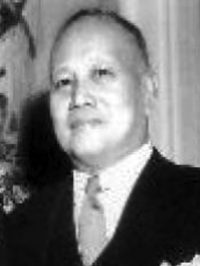Heard Mass.
Something should be said about the people living in the island outside the penal colony. Up to today, nobody has ever sneered at us. We have not heard any provocative remarks. On the contrary, we could read in their eyes that they fully sympathize with us. They communicated this sympathy, not only by oral expression, but by deeds. They shower us with donations of clothes and gifts of food. I brought no clothes as I lost them all when we moved from Baguio to Tubao. I was given many to make me comfortable. I have more food than I can eat; food I had not tasted for many months—fried chicken, adobo, fish, etc. Instead of indignation, we observed nothing but sympathy and approval. Certainly, men who had been traitors to their country or who had betrayed their people do not deserve such treatment.
Among our good friends are Dr. Dimayuga, Dr. Bunye, Col. Barros, one Mr. V. Macasaet, and many others who did not even want their names known.
The strict treatment continues. I fear that the attitude of the Filipinos towards America will change. The Americans were awaited with great anticipation. They were welcomed as true friends, as liberators, and as heroes. They were the legion of democracy and the Philippines will after the war enjoy a long era of prosperity and happiness due to the benevolence and liberality of the Americans. Let us see what will be the final attitude of the Filipino people.
Today I overheard a conversation among the men who had come from Bilibid where they had been detained since their arrest. They said that hundreds are already there and every day many more are coming. It appears that the C.I.C. requested each of them to make written statements naming persons who collaborated with the Japanese or who had committed murder, robbery or any serious act. Almost everybody complied. The statements contained names of many who really served the Japanese as spies or military police, but they also named many innocent persons. Those who had any kind of grudge against another included the name in his list. Generally, those mentioned are arrested and this explains the overflowing of prisons and concentration camps. It is reported that there was one who submitted practically the whole roster of high officials in the government so that they too would be arrested. His motive was to fill the prisons with influential persons so that they could constitute a good nucleus which could influence politics to work in favor of the prisoners.
In this connection, something should be said of the Counter Intelligence Corps (C.I.C.). Most of them are undoubtedly intelligent, qualified, and very sympathetic to the Filipinos. There are others who abuse their authority, and others whose procedures are objectionable. They would visit the prospective prisoners, and be as kind and friendly to them as they could be. The prisoners are allowed to go home and circulate very freely. Once full confidence is attained, the C.I.C. man would ask the prospective prisoners to make a full statement of their cases and to name persons who are really guilty. Believing that they could thus exonerate themselves, and at times as a spontaneous demonstration of cooperation brought about by such good treatment, they would “confess” everything. Later, however, they are arrested generally by C.I.C. men other than the men who first approached them. These are from stories of Govs. Aquino and Urquico and others who came from Bilibid. Because of this information, many of us now doubt the sincerity of Mr. Stanford. As I stated above, he was very kind. He even criticized President Roosevelt and many C.I.C. men. He distinctly and repeatedly told us that he fully sympathized with us and even believed that we should not have been molested.
Gov. Urquico is very bitter towards Americans. Like Recto, he also attributed our bad treatment to racial prejudice. I attach special importance to this because he is married to an American with whom he has many children. As far as I know they have been very happy.
